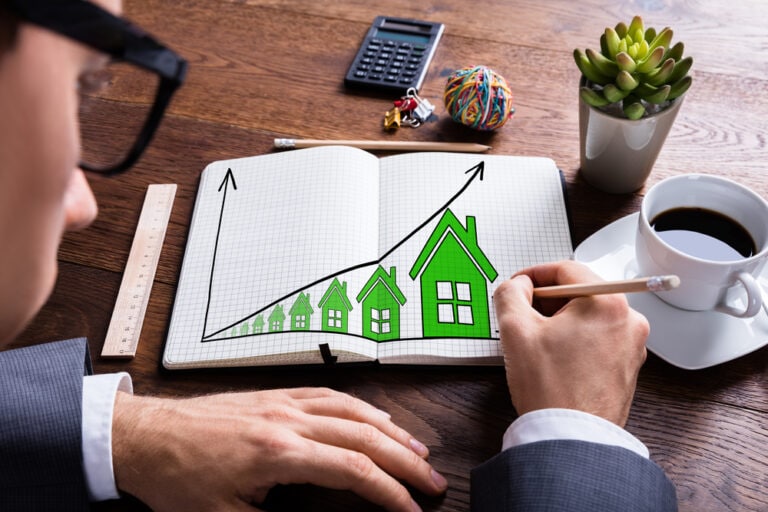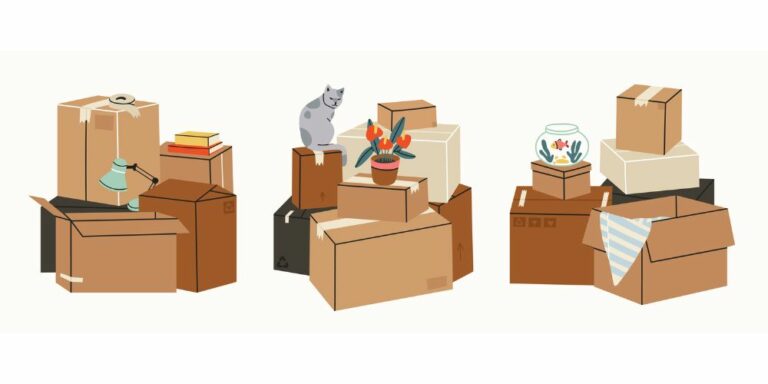Homeownership Leads to Happiness | Homeownership Advantages | Homeownership Disadvantages | Renting Advantages | Renting Disadvantages | Barriers to Homeownership | Commission Fees | FAQ
Amid stubborn inflation and economic challenges, homeownership remains a distant dream for many Americans, who are estimated to require an extra $11,400 in income for basic necessities in 2023. Legal actions, such as a recent $17.7 million damages order for price gouging eggs, also underscore the complexities of trying to afford everyday life.
Despite the looming economic challenges facing Americans, they’re still being sold the American dream. We found that 52% of homeowners and 56% of renters, however, are skeptical of home-buying advice in the media, prompting key questions. Is homeownership worth it? Are homeowners happier than renters?
This study explores the satisfaction and stress dynamics among homeowners and renters. Are homeowners fulfilled or secretly yearning for rental simplicity? Does homeownership bring stability, or is it a perpetual source of stress?
We surveyed 1,000 Americans (500 renters and 500 homeowners) to delve into the experiences of both Americans who own homes and Americans who rent, aiming to uncover whether homeowners are genuinely happier than renters.
🏠 Homeowners vs. Renters Statistics
- 69% of renters believe owning a home would make them happier. Jump to section.👇
- However, 60% of renters believe homeownership is out of reach. 👇
- 1 in 5 homeowners (19%) wish they were still renting, but 88% still say homeownership makes them happy. 👇
- On every single aspect of life — from overall quality of life to mental health — homeowners were more satisfied than renters when measuring on a scale of 1 to 10. 👇
- When asked to name the single biggest benefit of homeownership, the most common answer for homeowners was privacy (14%), while renters pointed to stability (16%). 👇
- Homeowners say property taxes are the No. 1 drawback of owning a home (64%), and renters agreed (51%).👇
- Renters say the worst part of renting is the instability of rent prices (60%), and homeowners agreed (67%).👇
- Homeowners (10%) are 2.5x more likely than renters (4%) to say there are no benefits at all to renting.👇
- When asked to name the single biggest benefit of renting, homeowners (20%) and renters (14%) cited not paying for maintenance or repairs.👇
- More than 2 in 3 renters (67%) are stressed about their finances, compared to less than half of homeowners (44%).👇
- Renters are 86% more likely than homeowners to not consider themselves financially comfortable.👇
- In light of a recent National Association of Realtors lawsuit about commission rates, a majority of renters (52%) and homeowners (52%) say having to pay the buyer’s commission fees would be a deterrent to purchasing a home. An additional 27% of each group said it would influence their decision to buy.👇
Nearly 9 in 10 Homeowners Report Owning a Home Makes Them Happier
Overall, homeowners are happier than renters. A striking 88% of homeowners express greater happiness with homeownership than renting, while fewer than 20% wish they were still renting. Notably, 90% of homeowners say they’re happier overall since they bought a home, and another 80% say owning a home was the best decision they ever made.
As a result, renters are eyeballing homeowners’ lives: 69% of renters believe owning a home would make them happier. They have good reason to wish they owned a home. Homeowners were more satisfied overall than renters when measuring quality of life aspects on a scale of 1 to 10.
Homeowners rate their overall happiness at 7.47 out of 10, on average. Renters report their level of overall happiness at just 6.2.
Homeowners and renters agree on one thing: 53% of homeowners and 54% of renters think homeowners have it easier. Interestingly, a majority of homeowners (55%) express optimism about America’s future, while a slightly lower percentage of renters (47%) share this sentiment.
Nevertheless, 74% homeowners and 66% of renters believe the American dream is attainable without owning a home, providing a nuanced perspective on homeownership and the broader American ideal.
What Are the Advantages of Homeownership?
When homeowners and renters were asked to identify the single most significant advantage of homeownership, privacy emerged as the predominant response among homeowners (14%), while renters predominantly pointed to stability (16%).
A resounding 82% of homeowners assert that owning a home provides them with financial security, emphasizing one of the key advantages of buying. Additionally, 91% appreciate the freedom to modify their homes as they please, a luxury not afforded to those renting.
When respondents were prompted to select all the benefits of homeownership, popular responses included not having to deal with landlords (60%), increased stability (56%), the ability to modify or upgrade the home (53%), and the absence of shared walls with others (53%).
Notably, 49% of homeowners also highlighted the appreciation of home values as a significant benefit, a common advantage that has only become more salient as home values increase rapidly.
Homeowners aren’t just happier than renters. They’re happier than their former selves, with 90% of homeowners reporting that they are happier since owning a home. As such, 78% share that they will never return to renting.
Homeowners also enjoy more leisure time compared to renters, which gives credence to the belief among both groups that homeowners have it easier overall. Homeowners are 35% more likely than renters to report having 7 hours or more of free time each week — 53% of owners versus 40% of renters. Interestingly, across various traits and attributes, homeowners consistently feel that they fare better than renters, showcasing a prevailing sentiment that they have a higher quality of life.
For example, 90% of homeowners believe their lives are more stable than renters, a sentiment echoed by 73% of renters. These findings collectively underscore the positive impact of homeownership on happiness, stability, and perceived advantages over renting.
Overall, renters are more stressed than homeowners. The average stress level among renters stands at 6.24 out of 10, while homeowners report a slightly lower average stress level of 5.12 out of 10 — an 18% difference.
Seventy percent of renters admit that renting induces stress, yet 49% believe that homeownership would bring them more stress than renting.
Notably, renters are 53% more likely than homeowners to view homeownership as a significant source of stress, with 10% of renters expressing this opinion compared to just 6% of owners. Conversely, owners are 38% more likely than renters to say homeownership is a source of happiness, with 31% of owners expressing this sentiment, compared to just 22% of renters.
However, renters may be onto something when they worry that homeownership could cause more stress.
What Are the Disadvantages of Homeownership?
Both homeowners (64%) and renters (51%) highlight property taxes as the biggest disadvantage of homeownership. Although an increase in home values can yield a large payout for homeowners looking to sell their homes, it can also lead to an increase in property taxes.
Our survey also revealed that 52% of homeowners believe owning a home is more expensive than expected, and 43% find it more challenging than anticipated.
According to 30% of homeowners, one of the biggest advantages of renting is not having to deal with homeowners associations (HOAs). HOAs are a common headache for homeowners because of fees and regulations that impede homeowners’ freedom to do what they want with their property.
HOAs are so bothersome that nearly 3 out of 5 homeowners (58%) report disliking them. Another 54% say not having to be responsible for repairs is another advantage to renting and the most popular benefit of renting among homeowners.
1 in 5 Homeowners Have More Credit Card Debt Since Buying a Home
Since purchasing their home, 20% of homeowners admit to being in more debt, while 1 in 8 (13%) report being in less debt.
Notably, 40% of homeowners claim to be free of credit card debt, with an additional 27% stating that their credit card debt has remained the same.
However, 50% of homeowners acknowledge having less disposable income since acquiring a home. Although homeowners, on the whole, express higher levels of happiness and lower stress compared to renters, it is essential to acknowledge the nuanced reality among American homeowners.
Mortgage payments could be contributing to a decrease in disposable income. The average monthly mortgage payment among respondents stands at $1,821, with a median payment of $1,500. Despite a moderate median payment, 35% of homeowners report paying $2,000 or more on their mortgage.
In comparison, renters report an average monthly rent payment of nearly $1,600, with a median payment of $1,200. It’s important to consider these figures in the context of the real median household income, which is just $74,580. A difference of $300 to $500 a month is substantial when budgeting for disposable income.
What Are the Advantages of Renting?
About 75% of renters enjoy the flexibility that renting provides. Renters can commit to short-term leases that provide them with the opportunity to travel around the world or scope out neighborhoods in their chosen city before hunkering down and buying a home.
But when it comes to the single biggest benefit of renting, both homeowners (20%) and renters (14%) agree that it’s not having to worry about maintenance or repair costs.
Nearly half of homeowners (47%) say they miss not having to take care of repairs, and 56% express a desire to spend less time on home maintenance. These findings indicate that most Americans view renting as a great option for people who don’t want to deal with upkeep.
The prevailing sentiment is that homeownership is unattainable for the average American, with 53% of all respondents holding this belief. Consequently, it makes sense that a lot of renters are not renters by choice or have given up on trying to purchase a home.
However, it’s also essential to acknowledge that not everyone aspires to own a home, and diverse preferences exist among American renters.
The Renters Who Never Want to Buy
A distinct subset of renters, constituting just 3% of the group, say homeownership provides no benefit over renting — 5x the number of homeowners who say the same (0.6%).
Furthermore, when asked whether they wish to own a home, a notable 28% of renters unequivocally respond with a “no.” We also found that 41% of renters reject the notion that owning a home leads to happiness, 35% more than homeowners who say the same (30%).
These findings highlight the diversity among renters in the U.S. Despite the perceived benefits of homeownership among the general population, there may always be a subset of renters who are content to remain so.
A resounding 31% of renters don’t think owning a home would make them happier. Additionally, nearly half of renters (49%) expressed indifference toward not owning a home, indicating that homeownership may not be a pressing concern for most renters.
Moreover, a substantial 56% of renters say they harbor no regrets about never purchasing a home, further highlighting the varied attitudes and priorities within the renting population.
What Are the Disadvantages of Renting?
Both renters and homeowners agree that the biggest disadvantage of renting is the instability of rent prices, with 60% of renters and 67% of homeowners identifying it as a drawback. Delving further into the tenant experience, 35% of renters express dissatisfaction with their landlords, while a substantial 62% say renting comes with too many extra – often hidden – fees.
Homeowners are fairly split on whether renting is easier. While 57% of homeowners think renting is not easier than owning a home, 43% find renting easier.
Homeowners (10%) are 2.5x more likely than renters (4%) to say there are no benefits at all to renting. This tracks with our findings that homeowners are overall more happy with their living situation and more inclined to take extreme views against renting than current renters themselves.
Renters do seem to align on the idea that a change in their living situation, such as homeownership, would lead to more happiness. They are 73% more likely than homeowners to believe they would be happier if their living situation changed (63% versus 36%, respectively). In fact, 37% of homeowners would be disappointed if they had to rent for the rest of their lives, compared to 35% of renters — a 5% difference.
Nearly Half of Renters Can’t Purchase a Home Due to Low Income
A significant 46% of renters cited low income as a hindrance to purchasing a home, while 42% deemed homeownership too expensive, period. Other factors that impede renters’ ability to buy a home include insufficient savings for a down payment (39%), high interest rates (31%), and a low credit score (29%).
Financial anxiety appears to be more pronounced among renters, with over two-thirds (67%) describing themselves as stressed, compared to fewer than half of homeowners (44%). Renters are notably 86% more likely than homeowners to consider themselves financially uncomfortable, emphasizing the disparity in financial well-being between the two groups.
This trend extends to concerns about their living situation. Renters are 81% more likely than homeowners to have frequently or constantly worried about it in the last seven days. A majority of renters (56%) report frequent or constant worry about money in the same period, while homeowners express concern but at a somewhat lower rate of 33%.
Americans’ Barriers to Homeownership
According to Americans, the main barrier to homeownership is the price of homes. Both renters (62%) and homeowners (69%) feel bad for anyone trying to buy a home in America in 2024, even as expensive home prices stagnate.
A majority of homeowners (53%) and renters (54%) also believe homeownership is out of reach for the average American. This sentiment is particularly pronounced among renters, with 60% expressing a belief that homeownership is out of reach for them personally.
Additionally, 35% of renters feel embarrassed about not owning a home, further emphasizing the emotional weight associated with housing status. Moreover, a significant 72% of renters assert that the high cost of renting poses a hindrance to saving for a home, shedding light on the financial strain experienced by those aspiring to homeownership.
Although homeowners and renters are united on the idea that homeownership is difficult for anyone in the U.S., they slightly differ on who they think should try and buy a home in this economy. According to both homeowners and renters, it is best for married couples or couples with children to purchase a home right now.
Overall, homeowners are more likely than renters to think every type of American should buy a home. For example, homeowners (64%) are 50% more likely than renters (43%) to believe single parents should buy instead of rent. Renters (33%) are 123% more likely than homeowners (15%) to believe white-collar workers should rent instead of buy.
It’s hard to say if renters or homeowners are more informed about home-buying challenges. A majority of both homeowners (52%) and renters (56%) think home-buying advice in the media isn’t trustworthy.
Our previous research indicates that there is bad advice proliferating in the media, or Americans are just under-informed. We have found that despite mortgage lenders recommending a 20% down payment on a home, 62% of Americans believe it is a requirement. We also found that more than half of Americans (51%) underestimate how much they’ll pay in Realtor commissions. Only 11% of Americans know that agents earn 6% of the final sale price.
A Majority of Renters and Homeowners See High Commission Fees as a Barrier to Homeownership
New developments in a National Association of Realtors (NAR) lawsuit, resulting in a substantial $1.8 billion verdict, revealed allegations that the group conspired with major brokerages to restrict competition and maintain artificially high commissions for real estate agents. Despite the ongoing appeal process, the real estate industry anticipates potential seismic shifts in the payment structure for agents.
Against this backdrop, a majority of renters (52%) and homeowners (52%) say having to pay buyer’s commission fees when purchasing a home would be a deterrent. Moreover, an additional 27% in each group indicate that such fees would significantly influence their decision to buy.
This highlights the increased awareness and influence of evolving real estate industry dynamics on the perspectives of both renters and homeowners in the context of home buying.
With the future of real estate commission costs in flux, though, a majority of homeowners (52%) and renters (52%) say they would still be willing to pay a 3% or higher commission fee to buy a home, — higher than the 2.65% average that goes to the buyer’s agent.
Interestingly enough, 29% of renters and 25% of homeowners say they would pay over 5% in commission fees. That’s good news for real estate agents, but bad news for future homebuyers on a budget.
Methodology
Home Bay surveyed 1,000 American adults, split evenly among those who own a home and those who rent. The respondents answered up to 24 questions about their views and preferences concerning homeownership and renting. The survey was conducted on Nov. 17-18, 2023.
About Home Bay
Where your real estate voyage begins. Since 2014, Home Bay has helped thousands of readers confidently sail through their next home sale or purchase. In 2021, Home Bay was acquired by Clever Real Estate, a free agent-matching service that has helped consumers save more than $160 million on real estate fees. Research by Home Bay’s Data Center has been cited by The New York Times, CNBC, MarketWatch, NPR, Apartment Therapy, Yahoo Finance, Black Enterprise, and more.
More Research From Home Bay
Articles You May Like
Frequently Asked Questions
According to both homeowners and renters: yes! Homeowners were more satisfied than renters with every single quality-of-life aspect we asked about. Learn more.
The 5% rule serves as a method for evaluating the financial viability of renting versus buying a home. Simply calculate 5% of the home’s value and divide the result by 12 months. If the monthly rental cost is lower than this calculated value, renting might be a sound financial choice.
Based on Census data, 66% of Americans are homeowners while 34% rent. Learn more.
When asked to name the single biggest benefit of homeownership, the most common answer for homeowners was privacy (14%), while renters pointed to stability (16%). Learn about other advantages of homeownership.






